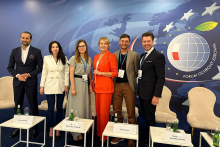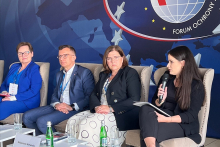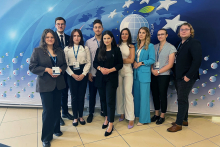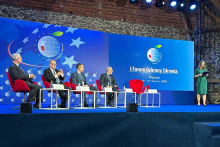The event was hosted by the Institute of Eastern Studies Foundation and Adam Niedzielski, Minister of Health, was the honorary sponsor. The Forum is an extension of the debates taking place during the Economic Forum in Karpacz in the field of health care. Specifically, experts talked about the support that could be provided to recover the health care system in Ukraine, building the joint purchasing policy in Europe, health care management and funding, innovative treatment, and digitalization of the sector.
Medical education
What is the demand for health care professionals going to be like in the upcoming years? Does the education system keep pace with generational change, with the new generations having different expectations as to career growth and working conditions? These are only some of the questions to which the answers were jointly sought during the session on medical education and challenges faced by this sector. Among the debate participants, there was Piotr Bromber, Undersecretary of State at the Ministry of Health; Zbigniew Gaciong, Rector of WUM; and Janusz Świeczkowski-Feiz. The speakers focused on the need to open a dialog with the students as well as to take action to encourage them to stay in Poland after graduation. In their opinion, adoption of this approach is of essential importance for maintaining high quality health care and respond to the increasing demand for specialists in the sector. Janusz Świeczkowski-Feiz spoke about how young medics were searching for places offering the best growth options. Another obstacle is the still prevailing practice of post-graduation learning through volunteering.
The Rector, professor Zbigniew Gaciong, proposed to introduce “teaching hospitals” as a category in the Polish education system, based on the U.S. example. By establishing a closer bond between clinical practice and the academic environment, teaching hospitals are able to promote continuous education and innovation, as well as streamline the transfer of knowledge from the area of research to clinical practice. Moreover, this structure would prepare medical students better for the reality at the workplace. Finally, it would improve the quality of health care through regularly monitoring the latest standards of evidence-based medicine.
Challenges for health care management
Piotr Bromber, Undersecretary of State, Artur Białoszewski, Head of SGH-WUM MBA in Health Care Program, representatives of the SGH Warsaw School of Economics, the Lazarski University Center of Postgraduate Studies and the Wrocław Innovation Center were debating on the implementation of effective management models in health care. These are essential for improving the system efficiency and achieving higher performance in health care. Artur Białoszewski proposed to introduce the role of a National Consultant for Management in Health Care in the system, to be followed by appointment of an expert workgroup at the Postgraduate Medical Education Center (CMKP) with the function of producing training standards for managers in health care. Those standards would promote better teaching quality control and therefore the requisite knowledge and skills among all the managers in Poland. Consequently, together with the activity of the National Consultant for Management in Health Care, they could contribute to the improvement of the overall service quality in health care through better management of resources and more efficient planning of health services.
The Voice of Students
Another panel held during the Forum was on “Education in Medical Professions - where are we heading? The CRUMS Recommendations”. The voice of students was presented by Agata Andrzejczyk, Chair of the WUM Students Government. She is also the chair of the Higher Medical Education Committee (KWSM) at the University Students Parliament of the Republic of Poland, and as the KWSM Committee leader, she was also a member of the workgroup responsible for writing the recommendations. Other participants of the debate included professor Marcin Gruchała, head of CRUMS, and Piotr Bromber.
What was discussed? The very important role played by students in the process of building and evaluation of innovative educational methods. The new growth opportunities for students: the job of a doctor’s assistant, and the “Young Teaching Specialist” program. There was also a mention of the subject of opening faculties of medicine at new universities. The students expressed their concerns regarding the infrastructure, availability of university teachers, and the learning process support methods offered. They emphasized the necessity of including students’ representatives in quality promotion and evaluation bodies, both at newly opened faculties and at existing universities.
Nomination and prestigious award
At the 1st Health Care Forum, professor Ryszard Gellert, director of the Postgraduate Medical Education Center (CMKP) announced the appointment of a Young Medical Staff Education Council. Our student Janusz Świeczkowski-Feiz became the chair of the Council. In addition, Janusz won a reputable “Young Leader” award. To read more, click the link




